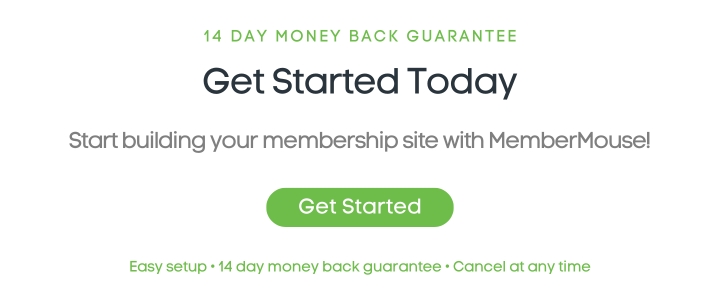In Conversation: The Vulnerability at the Heart of Success
Our weekly Office Hours sessions are a terrific opportunity for us to have one-on-one conversations with entrepreneurs at every stage of their business. Questions range from the specific and technical to the broad and big picture. The number of attendees varies so that sometimes Eric Turnnessen, our Founder and CEO who runs the sessions, finds himself going down a queue of submissions, trying to give the most thorough answer within the time provided, and then other times there are one or two people, and a more free-flowing conversation can occur. That was the case in a recent Office Hours.
Carl, a new MemberMouse customer building a site for expats in Portugal, joined the call. He expected to be a fly on the wall and listen to what others were asking while also watching his daughter at home and getting a bit of work done. However, upon finding himself with the opportunity to speak directly about his experience of starting a membership site, he found a quiet spot and unmuted his mic. The conversation that followed is one that is applicable to many in the getting started phase, which is why we wanted to share it directly with you.
Eric and Carl talk about the initial blockers that can get in the way when trying to put a site together. This is not limited to technical hurdles but also the mental and psychological questions that come up for anyone while packaging their offer and sharing it with others. This can be a very vulnerable time for an entrepreneur, complete with self-doubt and uncertainty about being good enough, combined with being overwhelmed by an ever growing list of things to do. In this conversation, Eric and Carl reframe this initial phase as an iterative process that is ongoing as opposed to an ultimate perfect presentation that is set forth into the world. We invite you to follow along with them in this exploration and hope it will shed some light on questions you've been wrestling with as well.
Carl: I really appreciate the opportunity to speak with you. Your company comes across really well…I'm into a steep learning curve, as I'm not a very technical person, but I'm loving what I find. And your help desk was very responsive yesterday. Really, really good. I think the emphasis is on me really to apply myself and get some way through it, but I'm really happy with the product and how it comes across and looking forward to learning more.
Eric: I definitely congratulate you, being in the position you're in. Starting a journey like this, there's always going to be obstacles that we have to overcome. And in this case, there's certainly a lot of things that manifest themselves as technical hurdles, but our team is here to make sure that those don't become barriers for you. So it's on you to, when you hit something and you have a question, to ask the question. But we'll do our best to support you. So with that in mind, where are you at in your journey right now, setting up MemberMouse with your business?
Carl: I'm at the very start of working on my offer page and then making all that work together. I'm actually a real newbie to WordPress. I had a WordPress site for a decade, I think, but never really used it. And went into a really quick immersion with the combination of MemberMouse, WordPress.com for hosting and Divi to do the theme that you offer, and took advantage of their latest offer as well. So all… I mean really at the start of it, and feeling that incredible journey of being over massively overwhelmed and then having a little breakthrough and thinking, yeah! I'm a developer and feeling really pleased with myself for the simplest things.
Take the Shortest Path to Getting your Offer Up
Eric: Right. Well, my advice at this time is to have a small number of things to accomplish. Because MemberMouse, Divi and other tools are designed to support businesses at any stage, there's certainly a huge chunk of things that you may feel like you have to get introduced to. But really at this stage, a success point would be for you to get an offer page up, using Divi to have the design, the look and feel that you want. And then you have a button on there where people can click to buy your product with a MemberMouse purchase link. And then MemberMouse at the checkout page. As you probably know at this point, we do have an integration with Divi so that we'll provide a style pack to help you get a head start, which will give you a look and feel for all of the MemberMouse core pages, including the checkout page, et cetera.
So they click the button to buy your offer. They go to the checkout page, they can sign up, you're connected to Stripe or PayPal or whatever you're using, and that's it. To me, that's the only thing that needs to be done in the beginning. Because at that point you can literally then start pushing traffic to that offer page. I think here's a mistake that a lot of new people make, oh, I need to do all of this stuff before I get my stuff out there. Which is a huge mistake because then it just becomes this internal self-propelled process. And to me, a lot of the enthusiasm that you can rely on for helping you get through any obstacles is getting feedback from your actual customers.
So get the offer page up as soon as it's in a place where people can buy it, even though you're going to have a lot of ways that it can be better. Start putting it out there. You can put it out to friends, family, whoever you want to first, but because the more that people are involved in your process, the more it's going to help you stay inspired. And literally at that point it's done, it's functional. That's the whole point of MemberMouse, is that within a weekend, you can get that set up so that now you have a functioning business that can always improve over time.
Carl: Yeah. I hear you. I hear you. And I do see that in helping other people create courses. I mean, it's a general life lesson, isn't it? It's letting the excellent spoil the good basically and never getting out there. And missing the excitement of that feedback loop because nothing gets people going better than making a sale and then having to deliver. Right?
Success Follows the Conversation
Eric: Right. It also opens the door to mystery because when you put something out there, you are, in a sense, opening up to the universe to say, “Hey, I'm putting this out there. Tell me where it goes from here.” I provide this advice from the experience of doing the opposite when I first started MemberMouse. I didn't release a product for one or two years because I was trying to fine tune it, fine tune it, in a vacuum. But the thing is, in retrospect, a lot of the milestones that have propelled MemberMouse forward in success have been these kind of synchronistic things where I didn't have control over it.
But what I did have control over was the fact that I actually took the risk of putting it out somewhere, which meant that somebody could see it, who could lead me to something else. You're kind of being vulnerable and saying to the overall community, this is what I have to offer, help me understand how I can be more of service. And if you respond to what they're saying, you've entered into a dialogue and success is a natural outcome of that process. I think a lot of people get it wrong, and they think, “If I get it perfect, successful will follow. But success really follows the conversation.”
Carl: Yes. I was prototyping a course called “Get Your Online Course Online in Seven Days,” which is exactly that. To go from Sunday to Sunday and have people not stop for want of perfection. I think anyone can get a course online in seven days if they go with what they've got. And as you say, even if that's for friends and family who buy on the seventh day. And how I market that, and I really appreciate what seems to be your position on this, is it's all an exercise in personal growth, isn't it?
Eric: It is.
Carl: To sacrifice your sense of perfection and shame and all these things that govern and drive us. These are the things that I think thwart people in having themselves self expressed as teachers and sharers of information.
Eric: Yep. In this digital age, it's still about that, the thing that's always been a human quality, which is a community. And even though it's not in the physical sense where there's just one small village and you're the bread maker and you rely on the guy who can mend the shoes and et cetera, it's still the same function. We all have our storefronts and we say, “Hey, I'm here to provide this and this is what I can offer based on my life experience.” And there's an exchange. Because I think if we all just stay in our houses, metaphorically, and don't have the courage to say, “this is what I can provide”, then we're missing a critical aspect of what it is to become an elder in a culture. You start to teach.
Carl: I'm really impressed with your position or your ethics about how you approach this. A lot of it becomes very rational, doesn't it? And two dimensional. And I've noticed the way you speak and the way you share about it, you clearly have a metaphysical understanding of where all this is coming from and the benefits of holding that position as well. The Zen of online course creation, right?
Zen and the Art of Course Creation
Eric: Yeah. But here's the trick. I think you have to be courageous enough to go out there and to quote unquote, “fail” at it. Because in terms of learning to be of service as a teacher… in reality anybody doing a course that's what they're doing… Everybody faces that when they're starting, that position of discomfort. Do I really have something to share? And the answer is always “yes” and “no”. The “yes” is the part where you've actually accomplished something. And you have the kind of fundamental toolkit of getting from point a to point b in a sense. The other part, the “no”, is that you're not granted a diploma or the title of being a teacher, unless somebody actually learns. You become a teacher if somebody is a student and the only way somebody can become a student is if you position yourself, you take the risk of being a teacher.
And I think what we learn when we go through that process is that being a teacher is a lot more about listening than about standing on a podium. Ultimately what I've learned is that anything that I end up saying in any situation that might be meaningful is a hundred percent driven by whoever's asking the question. So ultimately it's not that it was about any sort of preparation on my part, right? And that's why I learned that opening yourself up to the interaction as soon as possible with the people who can be a part of your community is the best thing. Because ultimately they're the ones who are going to be providing you with the thing that's going to attract more people. And then of course you can run into another dangerous aspect of human nature, which is egoism, where you forget the fact that these people are the ones holding you up and it's not the other way around.
Because at that point in the journey, you can take one road or the other, you think this is all about me, that takes you in one direction, or this is me just being of service to these people. And that'll take another direction. Both can lead to apparent physical success. But they feel totally different and they look totally different.
Carl: Yeah, absolutely. And the word that comes to mind is being ordained because there are a lot of self-proclaimed, I think, gurus and leaders, but it's the ordainment by others, isn't it? That really gives the true value to any, any label of teacher or guru.
Eric: It is. And ideally it would be that way. Right?
Carl: Yes.
Eric: But the thing is that because of our generation… I think the younger generations have caught wise to this, but our generation and previous to our generation were definitely spoonfed the idea that if somebody positions themselves in a good sense, in a marketing sense, that they're the right thing, then you just believe it. And so people become very good at presenting themselves as something and can mislead people into thinking they're something that they're not. Yeah. It's a very interesting game.
Carl: Yes, indeed. Well, I won't take any more of your time. I'm really pleased to have met you and if you need any help this side of the water. If there's anything I can do… I'm from the UK originally, but I live in Portugal now. If there's anything that occurs to you that I can help you with from that geographical position, I'd be delighted to help.
Eric: Thanks, Carl.
Carl: I thank you for your counsel today.
If you'd like to hear more conversations like this one, you can check out our library of Office Hours replays here.
Cynthia Thoennessen
Cynthia is the Head of Customer Experience for MemberMouse.
 Blog
Blog Podcast
Podcast Support
Support Customer Login
Customer Login









